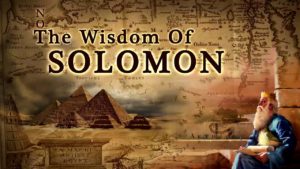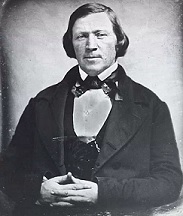They Will Not Search Knowledge, Nor Understand Great Knowledge, Part 2
On August  27, 1843, the prophet Joseph made the following remark from the pulpit:
27, 1843, the prophet Joseph made the following remark from the pulpit:
“When God offers a blessing or knowledge to a man, and he refuses to receive it, he will be damned.” (HC 5:555; TPJS, p 322)
He also warned that the church’s spiritual development on the whole is gravely slowed down when members refuse to receive more knowledge. He said:
“Ignorance retards the church.” (TPJS, p 138)
It’s one thing to refuse the restored gospel and the only authorized baptism that accompanies it, but it’s altogether another thing to accept this important covenant of baptism, and afterwards, remain largely unacquainted with the doctrines of its salvation. The Lord has said:
“For of him unto whom much is given much is required.” (D&C82:3)
With the Book of Mormon and the other standard works, living prophets, revelation, priesthood, and temples at our disposal, it would not be an understatement to say that we have been given so very much. Again, the Lord gave a warning to the children of Zion, even all, by saying:
“And your minds in times past have been darkened because of unbelief, and because you have treated lightly the things you have received.” (D&C 84:54-55; see also vs 56-57)
Again, Joseph Smith:
“When things that are of the greatest importance are passed over by the weak-minded men without even a thought, I want to see truth in all its bearings and hug it to my bosom. I believe all that God ever revealed, and I never hear of a man being damned for believing too much; but they are damned for unbelief.” (TPJS, p 374)
Are we possibly overlooking the greater things and guilty of a crime of ignorance or unbelief?
The Wisdom of King Solomon
 In the proverbs of Solomon, the son of David, King of Israel, we read:
In the proverbs of Solomon, the son of David, King of Israel, we read:
“A wise man will HEAR, and will increase learning; and a man of understanding shall attain unto wise counsels: . . . The fear of the Lord is the beginning of knowledge: but fools despise wisdom and instruction . . . How long, ye simple ones, will ye love simplicity? And the scorners delight in their scorning, and fools hate knowledge. Turn you at my reproof: behold, I will pour out my spirit unto you, I will make known my words unto you . . . But ye have set at naught all my counsel; I have stretched out my hand and no man regarded; . . . For they hated knowledge, and did not choose the fear of the Lord . . . therefore shall they eat of the fruit of their own way, and be filled with their own devices.” (Prov. 1:5, 7, 22, 29; Emphasis added)
This man Solomon, to whom God bestowed uncommon wisdom as one of his foremost strengths, tells us that gathering knowledge is the practice of a wise man. Additionally, here the Lord warns that those who despise knowledge; they shall be left to the fruit of their own understanding. Do we hunger for the deeper things of God; or, being unwise, do we hate knowledge and maybe even spurn those who seek for it and try sharing their findings in the hopes of edifying others?
Now for a very poignant question which is not at all intended to offend, but rather, to cause each one of us to honestly look introspectively and appraise our truest motivations in a gospel centered life. Do we shun the mysteries of heaven simply because it bores us to commit so much time towards study; or, is it possibly because we have become complacent—or even smug—towards our individual standing with God? Are we relaxed in our individual discipleship? Are we relaxed in our responsibility to learn, simply because we feel our prophets will teach us everything we need to know? If believing our prophets (who surely lift us and teach us) were all that is required for our salvation, then wouldn’t salvation in God’s kingdom be more of a collective salvation? I believe the scriptures refute that as a possibility and clearly places each individual’s salvation squarely upon the lap of each of us. Just because President Nelson and the brethren know God, that doesn’t mean I know Him. Their experiences with God are not my experiences.
One of the great benefits of frequent scripture study is receiving Holy communion with the Holy Ghost. By doing so frequently, we become more familiar with the voice of the Spirit and His direction. We also become better acquainted with the scriptures and the doctrine becomes so much clearer. Additionally, we hear the Spirit telling us what we can do to improve our discipleship and to draw much closer to the Lord.
The Glory of God is Intelligence
 To help us understand the principle of acquiring all the light we can, the Lord said the following through the prophet Joseph Smith:
To help us understand the principle of acquiring all the light we can, the Lord said the following through the prophet Joseph Smith:
“He that keepeth his commandments receiveth truth and light, until he is glorified in truth and knoweth all things.
Behold, here is the agency of man, and here is the condemnation of man; because that which was from the beginning is plainly manifest unto them, and they receive not the light.
And every man whose spirit receiveth not the light is under condemnation.
The glory of God is intelligence, or, in other words, light and truth.” (D&C 93:31-32, 36)
Let’s not forget the words of Alma:
“And therefore, he that will harden his heart, the same receiveth the lesser portion of the word; and he that will not harden his heart, to him is given the greater portion of the word, until it is given unto him to know the mysteries of God until he know them in full.
“And they that will harden their hearts, to them is given the lesser portion of the word until they know nothing concerning his mysteries; and then they are taken captive by the devil, and led by his will down to destruction. Now this is what is meant by the chains of hell.” (Alma 12:10-11)
In the previous post (They Will Not Search Knowledge, Nor Will They Understand Great Knowledge, Part 1), we learned that the scriptural definition of a hard heart is the inability to understand the mysteries. Is it possible that even we, as members of the Lord’s only true and living church, can be guilty of Alma’s acquisition?
If the glory of God is intelligence, or, in other words, light and truth; then how can we ever hope to return to Him if we choose to remain vastly unaware of the greater portion of His word, the things He is so familiar with and centers all His creations around? Do we sometimes suppose all knowledge and wisdom will be miraculously placed into our minds after death, or at the time of the resurrection: without having first learned how to put precepts into practice while in mortality? Through the prophet Hosea, the Lord gravely warns:
“My people are destroyed for lack of knowledge: because thou hast rejected knowledge, I will also reject thee, that thou shalt be no priest to me . . . I will also forget thy children.” (Hosea 4:6)
The Lord Has Given us His Counsel
We have seen in these last two posts that we have received counsel from Joseph and other prophets, but more importantly, we have received counsel from the Lord. Whatever our reason for not searching deeper and becoming individual scholars of the Lord’s gospel, we stand the grave risk of being tethered to the shallow end of the gospel bay and away from the deeper and much richer high-waters of the sea of knowledge.
With everything that has been said here, one thing is painfully certain; the Lord will not force us outward to learn more. Why? Because of agency! As defined in the Doctrine and Covenants, the decision is given to us individually, through our agency, to learn all we can (Behold, here is the agency of man, and this is the condemnation of man; See D&C 93:31-32, 36-37, 39-42, 48-49)
We can choose to search for truth and the deeper things of God; or, we can choose to set up stakes (as Joseph phrased it) and go no further; to rest on our individual spiritual plateaus and think to ourselves that all is well with us; yea, all is well in Zion. (2 Nephi 28:24-25, 29-30)
Burning Testimonies of Our Own
Though we love and sustain our brethren, particularly those in the First Presidency, Quorum of the Twelve, and our local leadership. Though we listen to and obey their inspired counsel and teachings, we need testimonies of our own; testimonies that are born exclusively through personal experiences. Though we eagerly follow their lead, we need to become familiar with spiritual and revelatory experiences with the scriptures of our own. It was Moses that yearned:
“And Moses said unto him, Enviest thou for my sake? would God that all the Lord’s people were prophets, and that the Lord would put his spirit upon them!” (Numbers 11:29)
Though it’s very important to follow the brethren, the Lord requires that we experience Him for ourselves. He longs for a burning relationship with each of us too.
The prophets speak in general terms to the church collectively, which is beneficial to every individual, but only in a collective way. Nonetheless, because salvation is a personal endeavor, and because each of us have our own personal strengths, weaknesses, struggles, thoughts, personalities, and all that comes with the perplexities of an individual mortal experience, each of us need individual tutoring fitted to our individual needs, and through the Holy Spirit, the Lord provides that revelatory experience. Great learning and power comes to those who tap into personal revelation. In a discourse delivered at the Salt Lake City Tabernacle, on February 20, 1853, President Brigham Young warned members:
 “. . . nothing short of the Almighty, nothing short of the Holy Spirit of Jesus Christ, can prove to you that this work is the work of God. . . . Salvation is an individual operation … There are those among this people who are influenced, controlled, and biased in their thoughts, actions, and feelings by some other individual or family, on whom they place their dependence for spiritual and temporal instruction, and for salvation in the end. These persons do not depend upon themselves for salvation, but upon another of their poor, weak, fellow mortals. ‘I do not depend upon any inherent goodness of my own,’ say they, ‘to introduce me into the kingdom of glory, I depend upon you, brother Joseph, upon you, brother Brigham, upon you, brother Heber, or upon you, brother James; I believe your judgement is superior to mine, and consequently I let you judge me; your spirit is better than mine, therefore you can do good for me; I submit myself wholly to you, and place in you all my confidence for life and salvation; where you go I will go, and where you tarry there I will stay; expecting that you will introduce me through the gates into the heavenly Jerusalem.’
“. . . nothing short of the Almighty, nothing short of the Holy Spirit of Jesus Christ, can prove to you that this work is the work of God. . . . Salvation is an individual operation … There are those among this people who are influenced, controlled, and biased in their thoughts, actions, and feelings by some other individual or family, on whom they place their dependence for spiritual and temporal instruction, and for salvation in the end. These persons do not depend upon themselves for salvation, but upon another of their poor, weak, fellow mortals. ‘I do not depend upon any inherent goodness of my own,’ say they, ‘to introduce me into the kingdom of glory, I depend upon you, brother Joseph, upon you, brother Brigham, upon you, brother Heber, or upon you, brother James; I believe your judgement is superior to mine, and consequently I let you judge me; your spirit is better than mine, therefore you can do good for me; I submit myself wholly to you, and place in you all my confidence for life and salvation; where you go I will go, and where you tarry there I will stay; expecting that you will introduce me through the gates into the heavenly Jerusalem.’
“. . . Now those men, or those women, who know no more about the power of God, and the influences of the Holy Spirit, than to be led entirely by another person, suspending their own understanding, and pinning their faith upon another’s sleeve, will never be capable of entering into the celestial glory, to be crowned as they anticipate; they will never be capable of becoming Gods. They cannot rule themselves, to say nothing of ruling others, but they must be dictated to do in every trifle, like a child. They cannot control themselves in the least, but James, Peter, or somebody else must control them. They never can become Gods, nor be crowned as rulers with glory, immortality, and eternal lives. They never can hold scepters of glory, majesty, and power in the Celestial Kingdom. Who will? Those who are valiant and inspired with the true independence of heaven, who will go forth boldly in the service of their God, leaving others to do as they please, determined to do right, though all mankind besides should take the opposite course. Will this apply to any of us? Our own hearts can answer . . .
“. . . We are organized to progress in the scale of intelligence, and the least Saint by adhering strictly to the order of God, may attain to a full and complete salvation through the grace of God, by his own faithfulness.” (Brigham Young; Journal of Discourses vol. 1, pp 310, 312, 313)
The Veil That Separates us From God
 According to Brigham and the scriptures, it’s not in the Lord’s economy for our salvation to be solely based upon our acceptance of the Lord’s prophets. As wonderful and spiritual as they may be, they can only lead us TO the veil. The Lord expects each individual to receive knowledge and revelation through the Holy Ghost for themselves in order to pass through the veil. In fact, passing through the veil is exactly what the Lord anticipates for each of us. This is where we receive even greater knowledge; knowledge which has been hid up because of unbelief. (See Ether Chapter 4; See also Jeffrey R. Holland, Christ And The New Covenant, pp 13-29[1])
According to Brigham and the scriptures, it’s not in the Lord’s economy for our salvation to be solely based upon our acceptance of the Lord’s prophets. As wonderful and spiritual as they may be, they can only lead us TO the veil. The Lord expects each individual to receive knowledge and revelation through the Holy Ghost for themselves in order to pass through the veil. In fact, passing through the veil is exactly what the Lord anticipates for each of us. This is where we receive even greater knowledge; knowledge which has been hid up because of unbelief. (See Ether Chapter 4; See also Jeffrey R. Holland, Christ And The New Covenant, pp 13-29[1])
We must become acquainted with, and accustomed to, the processes of the Holy Ghost and the various ways the Lord communicates to His children. Personal revelation is a necessary key to every man’s salvation, that we may learn to govern ourselves according to His desire. Again, here is the agency of man, and here is the condemnation of man. We must not only learn to come up to the veil, we must individually learn to pierce that veil; by personal revelation and continual learning. A continual diet of the milk of the gospel, or the first principle only won’t cut it. (Heb. 5:12-14; See also 1 Cor. 3:1-3) Only by consciously partaking also of the meat—and becoming a mature (full of age) bride in the Lord, Jesus Christ.
[1] Jeffrey R. Holland, Christ And The New Covenant, Deseret Book Company, Salt Lake City, Utah; 1997, pp13-29